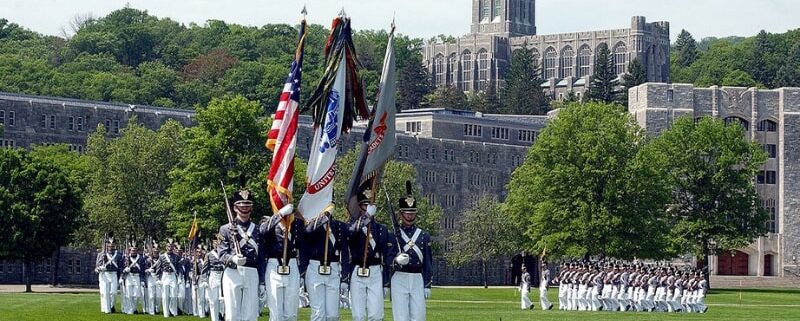Free College? Consider the US Military Academies
Not many colleges in the United States can claim to be free, but if your student is the right fit, one of the United States military academies could be an amazing bargain including tuition, room, and board. (Of course, all graduates will fulfill a post-graduation service requirement of at least five years as commissioned officers.)
Deciding to attend a military college is a big commitment. The application process is rigorous, and the colleges are very selective. However, if a student has what it takes to earn a spot, they will receive a top-rate education and important career experience which will be hard to beat. We are so proud of the students who choose this honorable path!
What are the military academies?
The United States has five military colleges:
- US Military Academy in West Point, NY
- US Coast Guard Academy in New London, CT
- US Naval Academy in Annapolis, MD
- US Air Force Academy in Colorado Springs, CO
- US Merchant Marine Academy in Kings Point, NY
According to the Department of Defense, the enrollment size of the service academies is relatively small, ranging from a high of just over to 4,500 at the Naval Academy and West Point to as small as around 1,000 at the Merchant Marine and Coast Guard Academies. For females interested in an academy, the highest percentage of women can be found at the Coast Guard Academy with 40%.
What is the admissions process like?
Military colleges are highly selective. West Point offers admission to only 12% of their applicants (on par with Vanderbilt or Northwestern Universities). Academies will evaluate applicants on academics, leadership, athletics, recommendations, and a personal essay. You can dig deeper into what each requires for application via the links above. Let’s look closer at West Point’s process as an example.
Students interested in West Point can begin the application process in January of their junior year. They begin by completing an online Candidate Questionnaire. The questionnaire will remain open until January of senior year, but with so many competitive candidates, they recommend students begin right away. Students will need an ACT with writing, SAT, PSAT, or PLAN scores for the questionnaire. (Note, for the Class of 2027, West Point had a “test flexible” policy. We don’t know if this policy will continue.) This questionnaire will be reviewed, and an admissions officer will let you know if you are qualified to continue in the process.
Prospective students should contact a local Field Force Representative to assist you in the process. Students should also consider attending the Summer Leaders Experience (SLE). This summer experience is optional, but it’s highly recommended to get a good sense if West Point is a good fit for you. Registration for SLE opens in January or February each year.
But wait…there’s more.
All of the military academies (except the Coast Guard) require nomination by either your congressional representative, state senator, or the Vice President. The West Point website recommends applying for nomination from each of these four (one representative, two senators, and one vice president), and they suggest starting the process right away. Nominations are due by January 31 of the year you start college. (Some students may be eligible for “service-connected” nominations.)
Unlike other colleges, the military academies will test your medical health and fitness prior to an offer of admittance. They recommend your medical exam (DoDMERB) be scheduled prior to the fall of your senior year. Candidates can be disqualified for a range of health conditions. The Candidate Fitness Assessment includes six scored physical activities including running a mile and doing push ups for two minutes. The complete list can be found here. This assessment is often administered by a PE teacher at your school.
The admissions process wraps up with an interview and a visit to campus during the academic year. Remember, as west Point’s website says, “there’s no room for ‘oops’!” so stay on top of deadlines. The final cut off is January 31 of your senior year.
Are the military academies right for my student?
Careful consideration should be given to this choice. This article from Forbes lays out some things to think about. How will your student adjust to a schedule that is not totally theirs to control?
Academy lifestyles are not as free and easy as you would find on a “normal” college campus. Students’ schedules are highly regulated with mandatory activities and limitations to leaving campus, and as you would expect, there are many rules to follow. Summer vacations are shorter.
Students must be “well-rounded” individuals meaning they have strong academics, are leaders, and are athletes. Cadets and midshipmen are expected to participate in some sort of athletic activity either at the NCAA, club or intramural level. They must abide by the honor code and hierarchies that are part of a military life.
If your student can thrive in all those conditions, they will be part of a close-knit family of students and faculty. This kind of structure of rules, responsibilities, codes, and hierarchies can help some students thrive. For students who are up to the challenge academically, physically, and mentally, they can graduate at no cost with a degree from a first-class institution – an experience that will open doors for them throughout their lives. They will be part of an exclusive group of military academy graduates. Good luck to all that embark on the process!
Enjoy this post? Don’t want to miss any future blogs about education, college, or careers?











